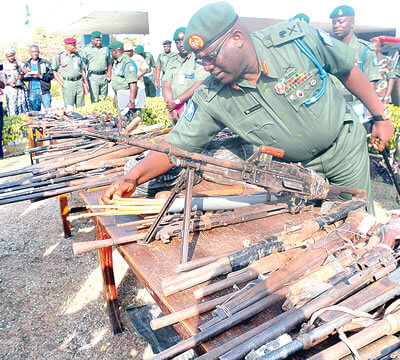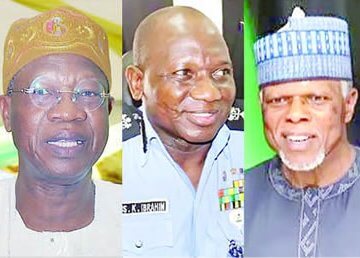With rising concerns on Nigeria’s state of insecurity, a situation which the proliferation of Small Arms and Light Weapons (SALW) has, no doubt, worsened, KEHINDE OYETIMI examines the varying factors promoting the prevalent distribution of arms, the attendant consequences and recommendations for checking the spread.
He looked disturbed as he sat in his chair. There was something amiss in his face. He had much to say but he was compelled to give out very little. With such burden, the Delta State police commissioner, Zanna Ibrahim, last Saturday, in Asaba, while disclosing that between September 28 and October 29, it arrested over 67 suspects in the state, pinpointed the proliferation of arms and light weapons in the state. For him, this constitutes the breach of the peace in the state and across the country.
Few months ago, the United Nations revealed a very troubling statistics, decrying the illicit proliferation of Small Arms and Light Weapons (SALW) in the country. According the UN, out of an estimated 500 million of such weapons circulating in the West African sub region, Nigeria’s holds an unnerving 70 per cent. By interpretative extension, there are about 350 million illegal arms in the country.
This was raised by Olatokunbo Ige, Director of the United Nations Regional Centre for Peace and Disarmament in Africa (UNREC), during a forum on National Consultation on Physical Security and Stockpile Management (PSSM), in Abuja.
A rather worried Ms. Ige revealed that Nigeria was under the siege of illicit arms. “The illicit proliferation of SALW has had a dramatic impact on peace and security in Africa, threatening not only the existence of the state, but also the livelihoods of millions of people across the continent.
“Nigeria is one of the countries that is experiencing some of the most devastating effects of the proliferation of SALW as a result of spillover effect of the recent crises in Libya, and Mali as well as unresolved internal conflicts in different parts of the country especially in the North East, Niger Delta and Southern regions. While reliable data on the numbers of these weapons circulating freely in the country is unavailable, analysts have, in recent times, estimated that of the about 500 million weapons that may be circulating in West Africa in 2010, some 70 per cent of these could be found in Nigeria.
“As alarming as these figures seem, it is very clear that if left unchecked, this scourge will not only jeopardize the developmental gains achieved over the last 50 years, but will also impede the nation’s capacity to achieve its developmental targets and therefore, negatively impact on the future generations,” she said.
Quite prominent in her addition was the wide acknowledgment that one of the major factors contributing to the illicit proliferation of arms is the ineffective stockpile management.
‘Using the 1959 law to tackle the 21st Century security challenges is ineffective’
In his reaction at the Abuja forum on security, chairman of the Presidential Committee on Small Arms and Light Weapons (PRESCOM), Emmanuel Imohe, argued that there are certain deformities in Nigeria’s Firearms law, insisting that it was obsolete. He stated that it had become ineffective given the realities of the current security challenges in the 21st century. He therefore called for collaborative efforts with relevant agencies. “The 1959 Firearms Act is obsolete and using the 1959 law to tackle the 21st Century security challenges is ineffective,” he said.
It is stating the obvious that the proliferation of small arms and light weapons would hold very serious security challenges for Nigeria. Instances of clampdown by security agents on the illegal movement of arms and light weapons abound. The Nigeria Customs Service, Tin Can Port Command, on December 30, 2015, successfully impounded a shipment of arms. It largely was made up of a pistol and 980 rounds of ammunition. Earlier in 2010, October to be precise, a search carried out by the State Security Service (SSS) officials brought to the fore the contents of 15 containers that were intercepted at the Apapa Port in Lagos. The bill of lading which the containers had had it that the contents were building materials but after the search it was discovered that the contents had arms and ammunition, which included mortar bombs, rocket launchers, small light arms and ammunition.
In 2012, 15 persons were arrested by the Benue State police command. A car was impounded alongside their arrest. The car which was laden with weapons was said to have allegedly belonged to one of the local government chairmanship aspirants at the ward congresses of the a political party.
The Nigerian Army equally successfully intercepted a Russian plane in December 2014 at the Aminu Kano International Airport, Kano State. The plane was loaded with a large amount of arms and ammunition going to Chad.
Nigerian porous borders remain sources of arms trafficking –Sociologist
According to him, “The end of the civil in Nigeria in 1970 marked a sharp rise in the proliferation of small arms and light weapons in the country. The Nigerian police recorded 12,153 incidences of violent crime associated with arms as against 2,315 incidences recorded in 1967 before the outbreak of the war.
“Researches in firearms control point to a multitude of unauthorised sources of firearms that includes, smugglers, illegal armed dealers and armed robbers, who have formed powerful cartels have flooded Nigeria with dangerous weapons. Nigerian porous borders remain sources of arms trafficking. This is in addition to firearms from blacksmiths and returnee ECOMOG soldiers from peacekeeping duties in Liberia, Sierra Leone and other places as well as unaccounted rifles from the disintegrated strike force commanded by Major Al-Mustapha during Abacha dictatorship. Both criminals and some unscrupulous security agents who have turned themselves to middlemen patronise these sources. Various groups, particularly ethnic militia – OPC in the South West, militants in the Niger Delta area, Egbesu Boys in the South South, Arewa Boys in the North and the Bakassi Boys in the South East, are believed to have imported firearms into the country.
“The cost of pistols and revolvers ranged from N3,000 to N7,000, depending on who is selling it. Since they are cheap and small, they can be carried around. Their long service life makes it possible for some weapons to be passed from one conflict to the other. The same gun used in armed robbery can be used for murder and assassination and thus continue to contribute to instability and violent crime in the country. Two-thirds of police deaths in line of duty are attributed to firearms of different sizes and brands.”
Speaking with Nigerian Tribune on contributory factors to the proliferation of arms, a legal practitioner, Ugochukwu Osuagwu, blamed Nigeria’s porous borders for the proliferation of illegal arms. “The problem is our borders. Most of the illegal firearms enter Nigeria through Niger, Cameroon and Chad borders,” he said.
‘Enlightenment, orientation programmes and security consciousness key to reducing spread’
Freedom Onuoha, in a report on the proliferation of small arms recommended that “the Nigerian government should strengthen institutions and processes of governance to enhance social provisioning for its citizens, who are becoming increasingly frustrated over governance failure, thereby resorting to violent crimes that increase demand for SALWs. Government at all levels – federal, state and local – need to partner with the private sector to undertake an aggressive job creation programme for Nigeria’s teeming and idle youths.
“There is a need for interventions at the national, state and local levels to be strengthened to promote peaceful coexistence amongst the diverse ethno-religious and political groups in Nigeria. This would help minimise the outbreak and persistence of violent conflicts that stoke arms proliferation. The National Orientation Agency should partner with credible civil society organisations (CSOs) and the media to mount enlightenment and orientation programmes on the practice of security situation awareness or security consciousness critical to crime prevention. This will enable people to appreciate the importance of monitoring developments around them and to report unwholesome activities (arms trafficking) to security agencies.”
In an interaction with Nigerian Tribune, human rights lawyer, Ikechukwu Ikeji, submits that “the proliferation of firearms in Nigeria is very disturbing as firearms of varying degrees have found their way into the hands of all sorts of people. There are laws regulating possession of firearms in Nigeria. There is the Robbery and Firearms (Special Provisions) Act 2004. We also have the Nigerian Firearms Act 1999. The Robbery and Firearms Act creates a list called prohibited firearms whose possession can only be upon a licence granted by the president.
“Examples of these include artillery, bombs and grenades, machine guns and rocket weapons. It also created what it called ‘personal firearm’ whose possession can only be licensed by the Inspector General of Police upon principles decided upon by the president. Examples of these include shotguns – not being automatic or semi-automatic shotguns – and certain kinds of sporting rifles.”
Jennifer Hazen, in a paper titled, Small Arms, Armed Violence and Insecurity in Nigeria: The Niger Delta in Perspective, contends that “An important element of addressing insecurity and violence in Nigeria is the strengthening of the national police force to ensure the rule of law and to prevent and respond to violence. Armed violence remains a common problem in Nigeria. In much of the country, such violence takes the form mainly of armed robbery. Small arms proliferation results from a combination of large numbers of arms in circulation and a number of incentives for individuals and groups to resort to violence.
“A key element of addressing insecurity and armed violence is comprehensive security sector reform. The government has yet to engage in a comprehensive reform programme, and will need to bring on board key leaders in the military and police in order to implement any strategic reform programme.”







